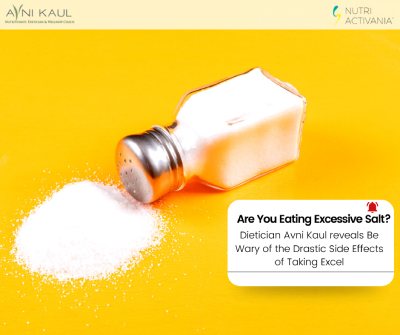
Are you consuming too much salt? If your answer is a YES, then it is time to alter your eating habits, specifically, in terms of salt consumption. As one study suggests, eating excessive salt could play havoc with your health.
Dietician Avni says with reference to the study published in the International Journal of Epidemiology, having too much salt can have adverse impact on your health.
Sodium is difficult to measure since it is a hidden component. Thus an exact estimate of how much to include it in food is not possible.
Salt plays an important role in our body’s proper functioning. It helps in regulating electrolytes that carry out signals to the human brain. It also stimulates adrenal glands, lowers strokes and supports essential minerals in the bloodstream. But only a small amount of salt is needed.
This blog by India’s top dietician Avni Kaul talks about the possible side effects on your health if you are consuming too much salt.

Water retention
Excessive salt consumption causes water retention and bloating in certain people. The effects can be short-lived if one deliberately decreases the sodium intake but they can seriously impact kidneys in the long run.
Affects kidney
If you eat too much salt, the increased sodium levels obstruct the smooth functioning of kidneys, which are not able to filter blood adequately.
Could cause osteoporosis
Excessive salt in food over a long period could lead to fluid collection in the body tissues and cells. This forces the body to excrete calcium, leading to the degeneration of bones and osteoporosis.
Causes strokes
When the kidneys begin malfunctioning because of not being able to flush out excess salt, the result is high blood pressure which can then lead to strokes.
Trigger migraines
Excessive consumption of salt also triggers headaches that might become migraines. These headaches are dehydration induced. You need to keep yourself hydrated and drink plenty of water to beat the side effects of salt.
Might delay puberty
According to one research conducted by the University of Wyoming, having too much salt might delay puberty in teens, which later could lead to behavioural and stress-related issues. It is better to consult your dietician, for making any changes in your diet or the consumption of salt in your daily diet.

I am Avni Kaul a Dietician in Delhi and Founder of Nutri Activania with Masters Degree in Food and Nutrition from University of Delhi and is also a Certified Diabetes Educator from Project Hope and International Diabetes Federation. She is a Leicester Mammas Ambassador trained in Lactation Counselling with NHS United Kingdom. Mammas support pregnant and new mothers and their families. Specializations of Avni Kaul Include Infant and Young Child Feeding Practises, Pre and Post natal diets, Fat loss, Muscle Gain and Holistic Health and Nutrition
Avni Kaul is Founder of Nutriactivania with Masters Degree in Food and Nutrition from University of Delhi and is also a Certified Diabetes Educator from Project Hope and International Diabetes Federation. She is a Leicester Mammas Ambassador trained in Lactation Counselling with NHS United Kingdom. Mammas support pregnant and new mothers and their families. Specializations of Avni Kaul Include Infant and Young Child Feeding Practises, Pre and Post natal diets, Fat loss, Muscle Gain and Holistic Health and Nutrition
2024 © All Rights Reserved